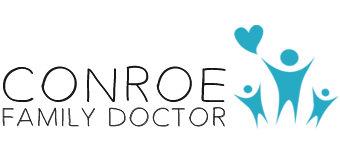
Understanding Hypertension and Its Risks: What You Need to Know
Hypertension, commonly known as high blood pressure, is a major health concern affecting millions of Americans. It’s often called the “silent killer” because it rarely presents symptoms until it has already caused significant damage. At Conroe Family Doctor, Dr. Trang Nguyen helps patients in Conroe, TX, navigate the complexities of hypertension to ensure better long-term health. This guide provides an in-depth look at what hypertension is, the risks associated with it, and how to manage this condition effectively.
What Is Hypertension?
Hypertension is a condition where the force of the blood against the walls of the arteries is consistently too high. Blood pressure readings are given in two numbers: systolic pressure (the top number) and diastolic pressure (the bottom number). Normal blood pressure is usually considered to be around 120/80 mmHg.
When the systolic number is consistently 130 or higher, or the diastolic number is 80 or higher, a diagnosis of hypertension may be made. There are two primary categories:
- Primary (Essential) Hypertension: This type has no identifiable cause and typically develops over many years. Factors like genetics, age, and lifestyle play a role.
- Secondary Hypertension: This type is caused by an underlying condition, such as kidney disease, hormonal disorders, or certain medications.
Understanding which type you have is crucial for developing an effective treatment plan.
Why Hypertension is a Serious Concern
The danger of hypertension lies in its ability to damage the body silently over time. Here’s how it can affect your health:
- Heart Disease: High blood pressure increases the workload on the heart, causing it to thicken and enlarge over time. This can lead to heart failure, coronary artery disease, and other cardiovascular conditions.
- Stroke: Hypertension is a leading cause of stroke. It can cause blood vessels in the brain to weaken, burst, or become blocked, leading to a potentially life-threatening situation.
- Kidney Damage: The kidneys filter waste from the blood, and high blood pressure can damage the delicate vessels in the kidneys. This increases the risk of chronic kidney disease and eventual kidney failure.
- Vision Loss: Hypertension can also damage the blood vessels in the eyes, leading to retinopathy and vision problems.
- Aneurysms: High blood pressure can cause blood vessels to weaken and bulge, leading to aneurysms. These can rupture, causing severe internal bleeding.
Understanding the risks of untreated hypertension is the first step toward effective management and prevention.
Recognizing the Risk Factors for Hypertension
Several factors increase the likelihood of developing high blood pressure, some of which can be managed with lifestyle changes, while others cannot:
- Age: The risk of hypertension increases as you get older, especially after the age of 45 for men and 65 for women.
- Family History: If hypertension runs in your family, you have a higher risk of developing it.
- Obesity: Excess weight increases the demand on your heart, leading to higher blood pressure.
- Sedentary Lifestyle: Lack of physical activity contributes to weight gain and high blood pressure. Staying active is crucial for prevention.
- Diet: Diets high in salt, fat, and processed foods can increase blood pressure. A balanced diet rich in whole foods is essential for maintaining healthy blood pressure.
- Smoking and Alcohol Use: Smoking and excessive alcohol consumption can damage the blood vessels, leading to elevated blood pressure.
- Stress: Chronic stress can contribute to hypertension. It may also lead to unhealthy coping mechanisms, such as overeating or smoking, which further increase the risk.
Signs and Symptoms: When to Be Concerned
Hypertension often develops without noticeable symptoms. However, in severe cases or when blood pressure levels are dangerously high, the following symptoms may appear:
- Severe headaches
- Shortness of breath
- Nosebleeds
- Chest pain
- Visual disturbances
- Dizziness
If you experience any of these symptoms, it’s crucial to seek immediate medical attention. Regular blood pressure monitoring is the best way to catch hypertension before it leads to serious complications.
Diagnosing Hypertension: What to Expect
When you visit Conroe Family Doctor, Dr. Trang Nguyen will assess your blood pressure levels and medical history to determine the appropriate course of action. Diagnosis typically involves:
- Multiple Blood Pressure Readings: Blood pressure can fluctuate, so several readings may be taken at different times to confirm a diagnosis.
- Blood and Urine Tests: These can help identify underlying conditions contributing to high blood pressure, such as kidney issues or hormonal imbalances.
- Electrocardiogram (ECG): This test checks for signs of heart strain or damage that may result from hypertension.
- Additional Monitoring: In some cases, 24-hour blood pressure monitoring may be necessary to get a clearer picture of blood pressure fluctuations throughout the day.
Treatment and Management of Hypertension
Managing hypertension involves a combination of lifestyle adjustments, medications, and regular monitoring. Here are the most effective strategies:
1. Lifestyle Changes
- Healthy Diet: Following a heart-healthy diet like the DASH (Dietary Approaches to Stop Hypertension) diet can significantly reduce blood pressure. This diet emphasizes fruits, vegetables, whole grains, lean proteins, and low-fat dairy.
- Regular Exercise: Aim for at least 150 minutes of moderate aerobic activity each week. Walking, swimming, and cycling are excellent choices.
- Weight Loss: Losing even a small amount of weight can have a significant impact on blood pressure. Focus on sustainable weight loss through balanced nutrition and physical activity.
- Limit Sodium Intake: Reduce salt consumption to less than 1,500 mg per day. Use herbs and spices for flavor instead of relying on salt.
- Quit Smoking: If you smoke, quitting is one of the best steps you can take for your heart health. Seek support if needed, as smoking cessation can be challenging.
2. Medications
In some cases, lifestyle changes may not be enough to control hypertension, and medications become necessary. Dr. Trang Nguyen may prescribe:
- Diuretics: These help remove excess sodium and fluid from the body, lowering blood pressure.
- ACE Inhibitors: These relax blood vessels and reduce blood pressure by blocking certain hormones.
- Calcium Channel Blockers: These prevent calcium from entering the heart and blood vessel cells, making it easier for the heart to pump.
- Beta-Blockers: These reduce the heart rate and the heart’s workload, decreasing blood pressure.
Each medication has its benefits and potential side effects, so it’s essential to have a thorough discussion with your healthcare provider.
Monitoring and Maintaining Healthy Blood Pressure
Regular monitoring is vital for maintaining healthy blood pressure and preventing complications. Here are some steps to consider:
- Home Monitoring: Invest in a reliable home blood pressure monitor to keep track of your readings regularly. This helps you stay on top of any fluctuations and identify patterns.
- Follow-Up Appointments: Schedule regular follow-up appointments with Dr. Trang Nguyen to assess the effectiveness of your treatment plan and make necessary adjustments.
- Identify Triggers: Keep a journal to note any factors that may cause spikes in blood pressure, such as stress, dietary changes, or lack of sleep.
- Engage in Stress-Relief Activities: Practices like deep breathing exercises, yoga, and meditation can help manage stress levels, positively impacting blood pressure.
Taking Control of Your Cardiovascular Health
Understanding the risks of hypertension and how to manage it can make a significant difference in your overall well-being. At Conroe Family Doctor, Dr. Trang Nguyen is dedicated to providing patients with the knowledge and tools they need to take control of their cardiovascular health. By addressing hypertension early, you can prevent complications and live a healthier, more fulfilling life.
Sources:
- Chobanian, A. V., & Bakris, G. L. (2018). The Seventh Report of the Joint National Committee on Prevention, Detection, Evaluation, and Treatment of High Blood Pressure. Hypertension.
- Whelton, P. K., & Carey, R. M. (2020). 2017 ACC/AHA Hypertension Guidelines. Journal of the American College of Cardiology.
- Williams, B., & Mancia, G. (2021). 2021 ESC Guidelines on the Management of Arterial Hypertension. European Heart Journal.


